Why do Ryan Coogler and James Cameron get to write mega-scripts while you’re obnoxiously constrained by the script-length Gods?
![]()
We are about to be hit with two of the longest studio releases of the decade. We’ve got Black Panther 2, clocking in at over 2 hours and 45 minutes. And we’ve got Avatar 2, which is somewhere north of 3 hours.
This got me thinking about the age old question of script length. When I first got into screenwriting, I was told (and promptly ignored) that your script should never extend beyond 120 pages. As time went on, that number dropped to 110 pages.
Despite this unofficial or official (depending on who you talk to) page rubicon, the newbie screenwriter receives mixed messages every time they go to the theater. They’re told their scripts have to be 110 pages as they watch Avengers Endgame arrogantly clock in at 150 pages. How does a young and confused newbie screenwriter reconcile this?
Over time, I’ve learned that the script length question is a nuanced one. There are certain genres that have low page counts and other genres that have high page counts. There are also additional variables that affect page length, all of which make up a complicated picture, one that seems to change depending on which angle you view it from.
But the basic equation works like this…
Character Count + Location Count + Plot Complexity = Page Count
Less characters = less characters to develop = less pages
Less locations = less situations to set up = less pages
Simple plots = less explaining = less pages
The horror movie I reviewed at the beginning of the month, Deadstream, about a single character live-streaming inside a haunted house… that movie was 90 minutes long. And, for those who don’t know, one page of screenplay equals one minute of screen time (this is why screenplays are written in that weird spaced out manner – to match out page time to screen time). So 90 pages is usually where you’re going to be when writing a 1-3 character movie in 1-3 locations.
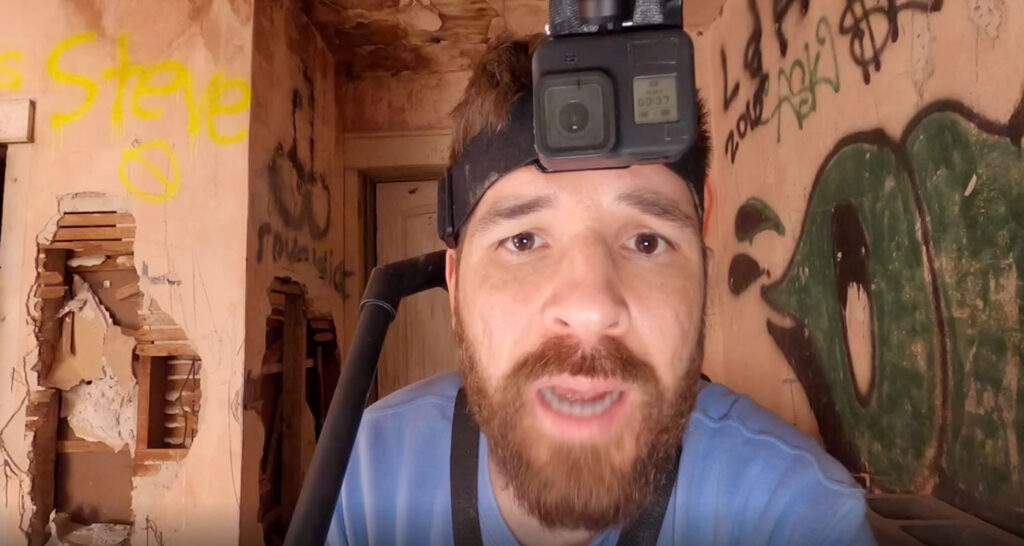
If you prefer to write non-contained thrillers, you’re going to need more page space. The word “thrill” implies a fast pace which means you’re still keeping the page count low. But these movies have a few more locations and characters, which should put them closer to 100 pages.
“Taken” is a good example of this. Tiny character count (only two main characters – the father and the daughter). Our hero is constantly on the move. Final page count for the script: 101 pages.
If you move over to comedies, these tend to work best in the 105-110 page range. Like thrillers, they need to move fast. And since most comedy plots are bare bones, you don’t need to spend a lot of time plotting. Even the slightly complicated storyline of The Hangover didn’t affect the page count that much, as the screenplay came in at 111 pages.
When you move up to action or action thrillers (Bond, Fast and Furious, Mission Impossible), now you’re tempting the page count Gods, moving closer to that most evil of script overseers: PAGE 120. This is because you’re visiting more locations, which requires more setup, as well as more explanation. And managing any plot big enough that we’re jumping to entirely different cities requires more time on the page. So these scripts will hover around that 120 page zone.
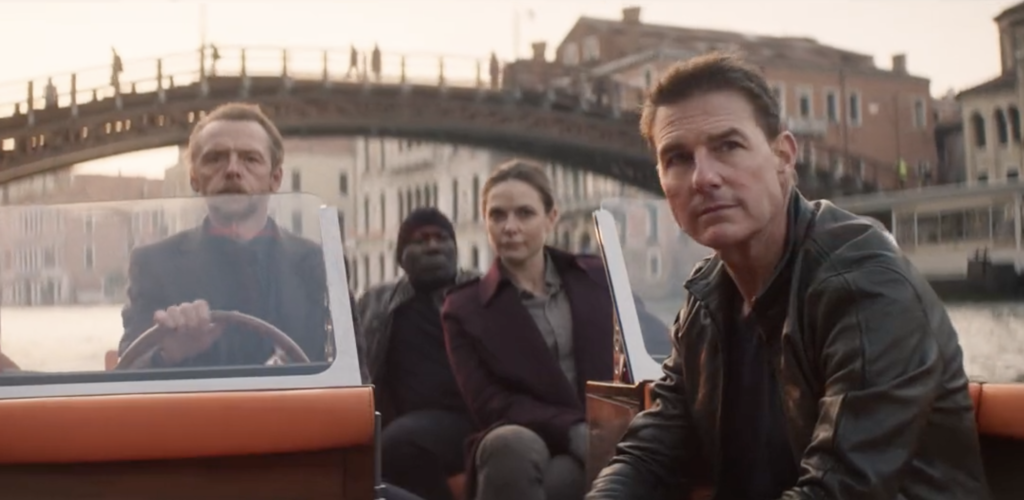
When you add sci-fi or fantasy into that mix, you really start struggling to keep the page count under 120. That’s because in addition to everything else you’re doing, you’re also adding mythology to the recipe. You need scenes that show how your world works (The Matrix spent 25 pages setting up the rules of its world). You also need more description than your average script because you have to explain all this stuff you’ve invented in your imagination. This can really bulk scripts up.
In general, however, the two things that have the biggest influence on your page count are your character count and your plot complexity.
It takes time to adequately set up a character. You need to show who they are in their everyday life. You need to show us what their job entails. You need to establish their relationships with other people. You need to introduce their flaw. That takes time.
If you then have two major characters – or three, or four – you can see how that could start chewing up page space. Cause you have to do the exact same thing for all those characters. This is why movies like Black Panther 2 and Avatar 2 are so long. They’re not only covering Black Panther and Jake. They’re covering the lives of the many many people around them. Like that Ironheart girl (the Iron Man offshoot). She’s going to need 10 pages of setup easy. That’s a lot of pages!
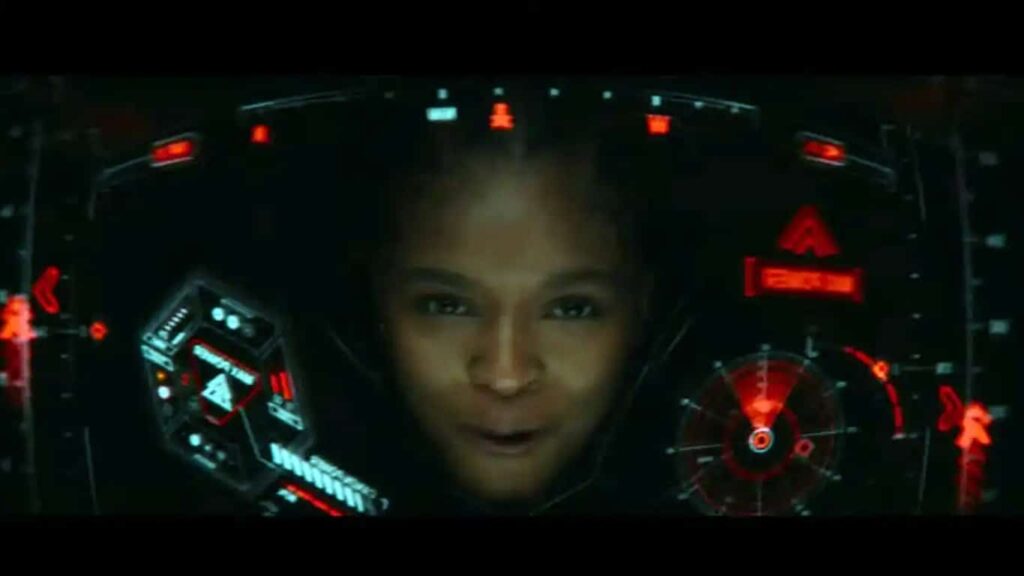
Also, to be clear, when I talk about character count, I’m talking about legit characters who have major roles. I’m not talking about the waitress or some loser who comes in for one scene to provide exposition. I’m talking about characters who have at least five scenes in your movie. The more of those characters you have in your script, the more pages you better prepare for.
The other thing that adds a lot of pages is plot. But it’s not just the plotting itself that brings your page count up. The more complex the plot, the more extensive the exposition. It requires more scenes with characters explaining things to other characters: what’s going on, what they’re after, where it is, how they’re going to get it. And that information is constantly changing, which requires another set of extensive exposition scenes. Watch an Avengers movie and track how often characters talk about what they need to do and how they’re gong to do it. It’s a lot!
Complexity of plot = more exposition, and more exposition is a page-eater. Your Fast and Furious crew discussing how they’re going to break into the White House could take up 5 pages easily.
Bringing this back to Black Panther 2 and Avatar 2: Both these movies have extremely extensive plots and tons of characters. I’m amazed that they’re able to keep the scripts under 300 pages with how much territory they cover.
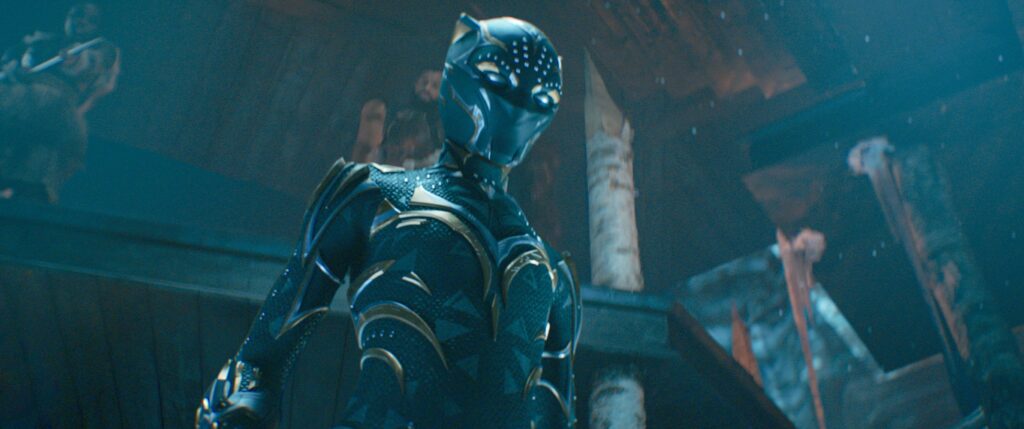
The question then is, why aren’t we allowed to do that in our scripts? This question requires a multi-faceted answer that I don’t have the time to get into. But the bullet points are, you’re writing a script to win a reader over. Ryan Coogler is making a movie to win over an audience. Two completely different scenarios. Look no further than the exit point options for each. Once Ryan Coogler has you at his movie, you’re stuck there. A reader, however, can stop reading your script the second they get bored. And if they’re wavering on page ten and see that they still have 120 pages to go, believe me, they’re going to give up on your script.
But the more nuanced answer is that you *are* allowed to write long scripts. You just need to know all the dramatic tricks in the book to suspend time. One of the reasons Titanic could be 3 hours and 14 minutes is because James Cameron is a master at suspending time. His entire story is built around dramatic irony (we know the iceberg is coming and the characters do not) which creates a strong line of both anticipation and suspense, each of which help us forget time. And that’s just one of the many tricks he uses.
If you know how to do that, then, theoretically, you can write a 300 page screenplay. I’m being serious. If you know how to make time go away in the reader’s head, they won’t check the page length. Cause they won’t want your story to end.
Unfortunately, this is a really hard thing to do. The best authors on the planet struggle to do it every time they sit down and write a book. So it’s going to be extra hard for anyone without a lot of writing experience.
And that’s where the real problems with page count lie. The people who usually write the longest screenplays are the newbies who know the least about screenwriting. They are in that wonderfully ignorant stage where they believe everything they write is gold. But it isn’t gold. It’s trash. Which means that readers are conditioned to think that any long script from another amateur will also be trash. Which is unfair, I guess. But, guess what? Life is unfair.
To summarize, your script’s length will be determined by the genre, concept, and content. More characters equals more pages. More intricate plots equals more pages. So watch out for both. The more you have to explain and describe (think sci-fi and fantasy), the more pages you’re gong to add. Use this information to make informed decisions about which scripts to write.
I’m not saying don’t write a long script. Some stories require more time. But you do want to be realistic and understand that the industry isn’t accepting of longer screenplays from unproven talent. So, if you’re going to write one, make sure you have a plan for distilling and eliminating time to such an extent that the reader never thinks about the page length while reading. They’re too busy enjoying your story.
Good luck!
P.S. – Newsletter coming to your Inboxes tomorrow night with an AWESOME(!!!) script that seems to have been forgotten by time. Oh, and don’t forget to e-mail me if you want a script or logline consultation. $100 off if you mention this article!!! (carsonreeves1@gmail.com)
Genre: Action-Comedy (Family?)
Premise: Two former thieves are having a hard enough time with their fussy newborn baby when a mishap draws them back into their old lives, forcing them to recover a priceless jade bangle, escape their boss’s murderous son and, toughest of all, get their baby to sleep through the night.
About: This script finished with 7 votes on last year’s Black List. The writers, Ted Kaplan and Jenni Hendriks, have written a couple of small novels. This is their first success story in the screenwriting world.
Writers: Ted Kaplan and Jenni Hendriks
Details: 109 pages
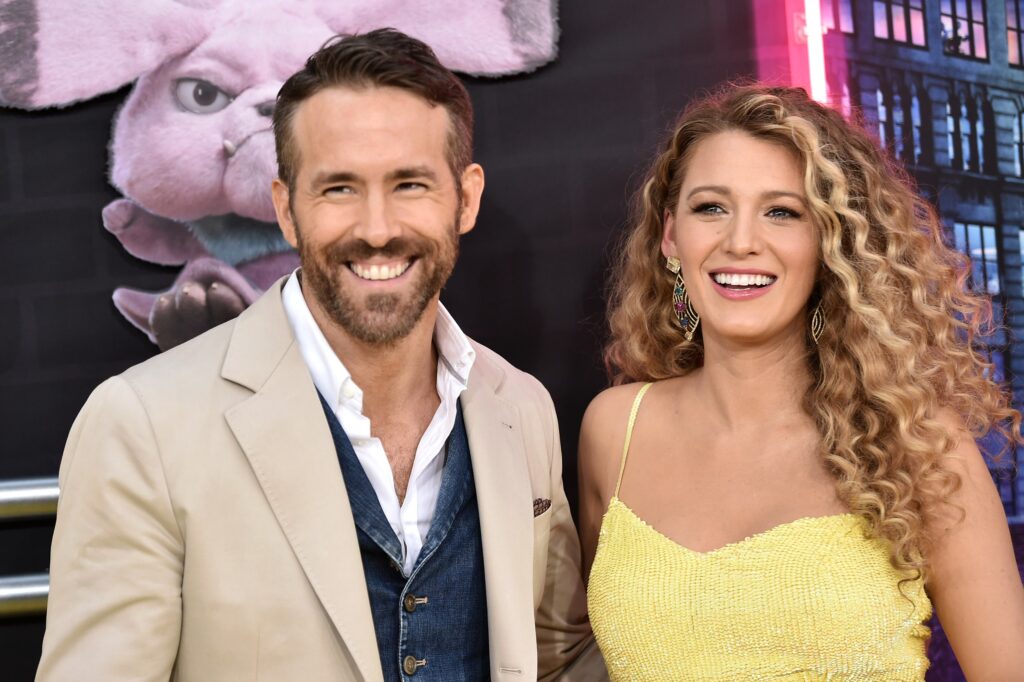 Real-life married couple Ryan Reynolds and Blake Lively for the leads?
Real-life married couple Ryan Reynolds and Blake Lively for the leads?
Comedy and Action.
If you can master the combination of these two genres, a huge world opens up to you. Cause this is where all the money is made. This is the powerball winning ticket. Not that thieving nickel slot machine.
Look at all the movies that make the most money. Marvel. Star Wars. Fast and Furious. Even Bond. What do they contain? They contain copious amounts of action, and humor!
In other words, these are great writing sample specs to get into the Marvel, the Lucasfilm, and Universal offices so you can pitch your takes on writing one of those movies.
My concern with today’s spec, however, is that it might be too family-oriented, and therefore get pigeonholed in the “lightweight” category. The lightweight action-comedy writers DO NOT get pulled in by Marvel and Lucasfilm. So let’s see which side of the thin cool line Sleep Factor finds itself on.
Mia and Ryan are the ultimate thieving couple. Because they’re in a relationship, they can read each other minds, as Mia utilizes her tech skills to fly drones around the museums they’re casing, pulling security guards along with them, while Ryan slips in and steals whatever they need to steal.
But those days are about to come to an end because Mia is pregnant. Congratulations, Mia. Cut to a year and a half later and these two are lame-o suburbanites who work at both Home Depot and some boring office job.
The two are not dealt a nice baby hand, as their daughter, Penny, can’t strop crying. The sleepless nights are taking years off the couples’ life. The only solution they’ve found to get their daughter to sleep is to drive her around in their car.
One day, when Ryan is coming home from the grocery store, he sees a car robbery taking place and immediately recognizes his wife as the leader of the team. Ryan chases her down then yells at her. She apologizes and says she’s lost her lust for life. That’s the only reason she started doing these late night robberies. And, after some discussion, Ryan admits he does the same thing.
While this conversation is happening, Mia’s very “hip” crew (“JIN-WOO, Korean-American, intense, probably wearing a social justice tee, LOLA, Black, the brains of the operation, and BEX, non-binary, all attitude”) steals the rare extremely valuable bangle bracelet that Ryan stole from his last job, and drive off.
That bracelet belongs to Ryan and Mia’s longtime handler, Joe, who tells them he’s going to kill them if they don’t bring it to him by morning. So off Ryan and Mia go, their baby in tow, to retrieve the bangle. But when the young hip crew make a side-deal with Joe’s biggest rival – the Estonians! – the stakes go up considerably. Do Ryan and Mia still have what it takes? And can they perform this mission with a baby in tow?? We’re going to find out!
Since this script has a lot of car-chasing in it, let’s talk about lanes.
You, the screenwriter, need to know what lane your script is in. You then need to play by the rules of that lane. So, if you’re in the slasher lane, you probably aren’t going to have any car chases. If you’re in the buddy-cop comedy lane, you’re probably not going to have any steamy sex scenes.
Your lane determines the rules you abide by.
I’m not sure Sleep Solution knows what lane it’s in. At first I thought this was a family action movie in the vein of Adventures in Babysitting. But there’s quite a lot of swearing here. And you can’t swear so much in a family movie. So that told me they’re trying to pull in the regular action demographic.
Except which action fans are going to to pay to see a movie about a couple stealing things while trying to keep their baby asleep? It’s not cool enough. I’m sorry but you can dress it up any which way you want. Parents aren’t cool. nd babies aren’t cool.
That leaves the script with a very narrow audience, as far as I can tell. You’re basically aiming for the “young parents” demo. And I don’t know if those people have time to watch any movies, much less this one.
In addition to this, the movie missed out on its best idea. They establish early on that the baby can’t sleep unless it’s in a car driving at least 45 miles per hour. I loved the motivation for this. The baby was in Mia’s tummy during all her wild car chase burglaries. So it makes sense that it feels the need for speed. But that storyline is abandoned early on. There are plenty of times when our couple stops and discusses things. At one point they even pawn the baby off on a babysitter.
Isn’t the best version of this movie a modern-day family-friendly take on Speed? They can’t let the car stop or else the baby wakes up? Admittedly, that would be a very challenging script to write. But I say go with the best hook you’ve got. There’s no true hook here if the baby can be given over to other characters at certain points in the story.
The script also suffers from a vanilla execution.
I’ve struggled with whether the family-friendly comedy can have anything other than vanilla execution. You can’t get too wild in the PG space. But then I always think of Pixar movies. Those films manage to bring in parents, kids, as well as the 18-35 demo. They achieve this because their films are highly imaginative and put a premium on character development.
There’s very little imagination in Sleep Solution.
In fact, there was only one scene that I felt was worthy of a good spec screenplay. Mia and Ryan capture one of the woke crew members and demand to know where the other crew members are exchanging the stolen bangle bracelet..
The scene happens in the back of their car and Bex, the crew member, won’t budge. He’s not giving up the information. So Mia proceeds to change Penny’s diaper in front of him as a torture device. To a 21 year old kid, this is pure hell. He fights it and fights it as Penny goes into extreme detail about the diaper-changing process until it just gets too disgusting and Bex cracks.
I absolutely love when writers do this. They write a scene THAT COULD ONLY OCCUR IN THEIR MOVIE. You have to remember, people, that readers read the same average to slightly-above-average scenes all the time. We’ve become immune to them. One of the most effective tools you have against this is mining the unique nature of your concept.
If Mia and Ryan had threatened Bex with a gun or a knife, we could’ve seen that in any movie. This was the far better, and funnier, option. But that was it. We never get another scene like it again.
Due to the vanilla execution and lack of imagination in Sleep Solution, I can’t recommend it. It has that professional sheen to it that differentiates it from the average amateur script. But in order to get your script beyond the bottom layer of “professional,” you have to push yourself in the execution stage.
A writer once told me about the way his mentor would critique his screenplays. Whenever he encountered a scene, moment, or set piece that felt average or slight-above-average, he would write down: NGE. That stood for “Not Good Enough.” In other words: YOU NEED TO TRY HARDER.
Script Link: Sleep Solution
[ ] What the hell did I just read?
[x] wasn’t for me
[ ] worth the read
[ ] impressive
[ ] genius
What I learned: Again, write scenes that can only happen in your movie because they evolve from your specific premise. A classic famous example of this is the birth scene in A Quiet Place. That scene could only be that effective in that specific environment. Sadly, whenever I see writers succeed at this, they only do it once or twice a script, like here. Push yourself more. Try to come up with five of these scenes — six, seven, ten. The more you’re mining your specific premise, the more original your script is going to be!
A new comedy script is just itching to resuscitate Jennifer Lawrence’s career!
Genre: Comedy
Premise: A woman who can no longer pay her city’s rising property taxes is forced to become a one-time-only escort for a family trying to get their incel virgin son laid.
About: This is J-Law’s next movie. Writer-director Gene Stupnitsky shot onto the scene with his spec, Bad Teacher. More recently, he wrote and directed the really funny, Good Boys. Co-writer John Phillips wrote the spec, Dirty Grandpa.
Writer: Gene Stupnitsky and John Phillips
Details: 113 pages

When you break it down, there was no way for Jennifer Lawrence’s career to keep going at its sound-barrier-breaking pace. In her very first starring role, the indie movie, Winter’s Bone, she got all sorts of high praise for her performance. This lead to The Hunger Games, which became a gigantic franchise, which led to her David O. Russel collaborations, where she was routinely nominated for Oscars.
There are very few people who attain that kind of hot streak and keep it going for more than a few years. She did it for a decade. So it was only natural that she’d come down to earth at some point. It was just a matter of when.
Russel destroying that great “Joy” script was the first nail in the coffin. Starring in that weird unsettling movie by Darren Aronfsky didn’t help. Passengers was a sci-fi movie that audiences couldn’t connect with no matter how much they wanted to. And Don’t Look Up was a curiosity of a movie, but not much more.
I like Jennifer Lawrence. I think she’s one of the few real people in Hollywood. I love the story about how she’d end her acting days on the “Mother” set by watching episodes of Keeping Up with the Kardashians. How many actors would admit that?
But she’s at a crossroads. She doesn’t really have an identity as an actress. So if she’s going to pull herself out of this slump, it’s going to have to be by picking good scripts and good roles. “No Hard Feelings” is sort of a return for Lawrence to her Silver Linings Playbook days. The question is, is it as good of a script as Playbook? Let’s find out, Buster Brown.
Margot, who’s about 30 (she won’t tell us her true age), is a townie in the upscale summer neighborhood of Montauk. The more rich people who move into town, the higher her property taxes get. And it’s gotten to the point where she’s Uber-driving sunrise to sunset to keep her home.
But then her car is repo’d, which means she can’t make any money. What does she do? Her married couple friends are perusing Craig’s List where they find an odd personal ad. A well-to-do couple are offering a car to a woman who can “date” their 18 year old son.
So she goes in for an interview. The between-the-lines conversation is such: You get the car if you have sex with our son. He’s an incel. He’s going to Princeton next year. They’re afraid that if he doesn’t know how to get girls, he’ll be alone for the rest of his life. But, of course, he can’t know that they’ve hired her. Or else he won’t get any confidence from the experience.
Margot doesn’t have to think twice. She needs that car so she signs on the dotted line. She then heads down to the dog rescue organization where our super-nerd incel, Percy, works. Margot plays the flirt card hard. But Percy is so devoid of awareness when it comes to women that he doesn’t understand what’s happening and tries to get away from Margot.
Thus begins an ironically impossible pursuit of this man. Margot is used to getting laid any time she wants. But Percy is like a sensitive flower. He needs to be comfortable with the person. He needs to like them. He needs to hang out with them a lot. All things that Margot has no interest in doing. She just wants to get the bang finished so she can get that car, yo.
As some of you have no doubt predicted, Margot eventually sees beyond the geeky virgin version of Percy to the sweet inexperienced nice guy. So she starts to like him as a friend. But, of course, Percy ends up finding out what his parents did and confronts Margot. She tries to explain her side but the truth is, there’s nothing good about her side. Which means Margot is left alone to examine who she is at this point in her life and what it is she actually wants.
“No Hard Feelings” has a clever opening scene.
It shows Margot’s car being repo’d in front of her house. Margot comes running out to stop the tower. We then quickly learn she dated this guy then ghosted him. Margot puts on the charm, telling the guy she still likes him, please don’t take her car. He’s softening up until, in the background, we see some hot half-naked guy come out of Margot’s front door and start doing squats in the front yard. That’s enough for our tower. He calls Margot a beeyatch and leaves with the car.
Why is this opening good?
It does two things. First, it sets up Margot. She’s obviously a mess. She’s sleeping with new guys every night, having fleeting meaningless relationships. This gives us a great feel for the character. Second, it sets up the plot. That car is her money-maker. With that car gone, she can’t pay the mortgage.
In addition to this, the writers made the tower a former boyfriend. This added an additional entertaining element to the proceedings. Margot isn’t just spouting out plot-related information like a robot. She’s trying to manipulate this guy via their previous relationship in the hopes of getting her car back. It’s a keen way to hide exposition.
Unfortunately, this opening scene is the high point of the script. Nothing afterwards contains as much thought as was put into this scene. Which is a good lesson, by the way. Yes, we all know our first scene has to be great in order to capture the reader. But that doesn’t give you permission to make every subsequent scene less great.
Use that opening scene as a bar to either meet or exceed.
The script has two problems, and they’re unfortunately major ones, as they revolve around the concept and the character. It’s possible to recover from a weak plot at times. It’s possible to recover from a weak relationship in the movie. But if your problems revolve around the concept and the protagonist? You’re in dangerous waters, my friend.
Look, the concept is just unimaginative. I always say that if your concept could’ve been written 50 years ago? It’s probably not fresh enough. Now this isn’t always true. Stiller’s “Meet the Parents” could’ve been set in 1950 just as it could be set today. But this is more of a comedy built around the concept. The concept is supposed to be the highlight. And I’m not seeing enough razzle-dazzle in a 30 year old who has to sleep with a 20 year old for a car.
I was so convinced that that couldn’t possibly be the finished concept that I kept waiting for the real concept to arrive. I thought maybe Percy would secretly be a vampire or something. But no, that’s the concept.
Which brings us to the second major issue, which is that our main character looks really bad here. We’ve got this slutty selfish woman who will bang anything that walks. And she’s going to take advantage of this poor young socially awkward virgin… to get a car! To get a car!!! There’s no way to sugarcoat how unlikable someone like this is.
I suspect that the writers are going for a “forward thinking” sort of “modern feminism” take here – where we’re supposed to like this girl in spite of her flaws. I mean, we’re okay with guys doing this. So it’s time for us to root for girls acting the same way.
First of all, I don’t buy that logic. If this were reversed and it was a male character, I wouldn’t like him either. Actually, we have a fairly recent comp for this in “Red Rocket.” That older character gets in a relationship with a younger character. The difference was he was a genuinely nice guy. And he wasn’t trying to deceive anyone. He really did like the girl. Margot is all about the deception and only wants to sleep with this kid to get a car.
Why would I ever like or root for someone like that?
It got me thinking – what’s the angle here? Why do they think this is going to work? The only answer I could come up with was that Stupnitsky and Phillips were writing their version of The Graduate. This isn’t a comedy in the vein of Bad Grandpa or Bad Teacher. It’s darker and we won’t really see that until we see the way it’s shot. Cause you can shoot these things and score these things to take on a completely different tone. Like the way Risky Business looks like a teen comedy on the page but is actually quite the dark movie in its execution.
But I don’t know, man. I don’t know how you navigate such a repulsive concept and easy-to-dislike main character. It’ll be a challenge for sure. And it’ll probably come down to J-Law’s performance. We’ll see what happens!
[ ] What the hell did I just read?
[x] wasn’t for me
[ ] worth the read
[ ] impressive
[ ] genius
What I learned: Despite my issues with the script, I give the writers kudos for introducing a non-traditional romance. It’s hard to find any romantic relationship in movies we haven’t seen before. This one I genuinely haven’t seen.
HAPPY SCRIPTOWEEN!
Genre: Horror
Premise: A group of teens on a homecoming vacation stumble upon the ultimate house of horrors, with a chainsaw-wielding maniac using his home as a de facto human slaughterhouse.
About: The Texas Chainsaw Massacre shoot was infamously harrowing due to how hot it was (the movie was shot in 100 degree Texas heat for weeks). The actor who played the hitchhiker said shooting his scenes was the worst experience he’d ever had in his life due to the extreme heat and excessive body odor. “And I fought in Nam,” he pointed out. While director Tobe Hooper would go on to have a successful career after the film, nobody else on the production or cast would experience any success in the business.
Writers: Kim Henkel and Toby Hooper
Details: about 90 minutes long
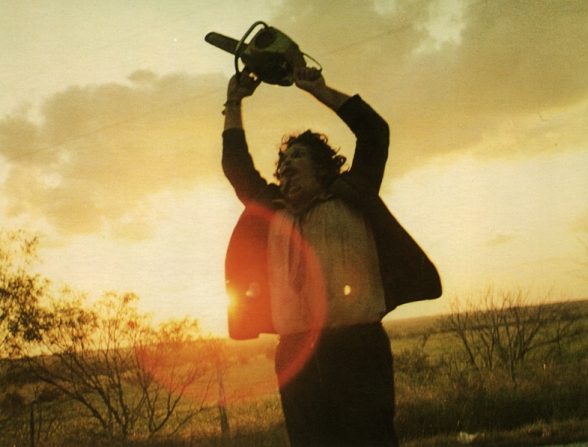
They don’t make this movie anymore.
The industry doesn’t like exploitative violence that doesn’t seem to have any point other than making people suffer – women in particular.
Is it a good thing that we’ve ditched this sub-genre?
I would argue it isn’t.
There’s something to be said for preying on our “worst case scenario” fears in a fake, and therefore, safe, medium. It’s very likely you will never find yourself kidnapped by an insane crazy backwoods family in your lifetime. But that doesn’t mean you don’t fear it in the back of your mind. It doesn’t mean that when you go on that road trip and you take some barely traveled road into some sketchy decaying town that you aren’t thinking, “Um, am I going to end up being turned into a rack of barbecue?”
That’s what good horror movies are good at – they identify an experience that all of us are scared of and they ask, what would happen if you really found yourself in that experience? We get to live it, but from the safety of the movie theater.
Sally, her wheelchair-bound brother, Franklin, and friends Pam, Kirk, and Jerry, are headed back to Sally and Franklin’s home town in the heart of Texas for a little mini-vacation. After failing to score some gas, they stumble upon a mentally unwell hitchhiker who starts rambling on about the old town slaughterhouse.

They wisely kick that dude out of the car before heading to Sally’s old home. Kirk and Pam decide to head down to the old pond to get a swim in, and while they’re there, they spot an old house nearby. Kirk thinks they might have some gas so off they go.
Kirk gets about 15 feet into the house when a crazed masked man bashes him over the head with a hammer. Pam is soon captured as well, and we get the sense that this house is being used as a de facto replacement for the old slaughterhouse. Except now, instead of slaughtering animals, they’re slaughtering humans.
Jerry gets taken out next. And, as a still ignorant Sally pushes her brother around, our slaughterhouse buddy arrives with a chainsaw and plunges it into poor Franklin. Sally runs all the way back to that gas station, but it turns out the owner is part of the family, and brings her to the home, where she’s the guest of honor in the most horrific bizarre dinner ever. Of course, the point of the gathering isn’t a kind one. They plan to butcher her for dessert. Somehow, Sally is able to escape the home. But Leatherface and his chainsaw are close behind.
Whenever I look back on these classic movies, I try to identify what it is they did right that all their other failed competitors, both then and now, did wrong. Cause when I watched Friday the 13th, I’m not going to lie. I didn’t see much that movie did right over other films.
But you can definitely tell why Texas Chainsaw Massacre was better than all the rest. There are a lot of small but clever writing choices that tell me they actually thought about the script beforehand. For example, they go out of their way to set up the slaughterhouse in the opening act, which heavily plays into what goes on later.
A lot of horror writers wouldn’t have bothered to do that work. They would’ve thought of this cool mask and a guy with a chainsaw and that’s all they’d need. They wouldn’t need *why* or *how* that person became like that. But doing that extra work clearly helps because everything in this house and everything about this family and everything about the final dinner really goes back to the slaughterhouse.
But let’s rewind for a second. Even before the slaughterhouse, I thought Hooper made some strong writing choices. I liked that he made Franklin paraplegic. One of the first scenes is him needing to be wheeled off the side of the highway to take a leak. It’s kind of sad and awkward and unsettling, which is exactly what you want in a horror movie. You want your viewer to be unsettled.
Also, lots of writers don’t put any imagination into the group setting of these movies. Hands down, 99 out of 100 would’ve went with five able-bodied friendly teens. Franklin adds a completely different dynamic to the group since he’s not a friend. He’s the brother of one of the characters. So you’re already making the group off-kilter. Which is AWESOME. That’s what you want to do with group dynamics. Make them imperfect. Because that imperfection is going to come out in interesting ways, starting with the dialogue and the way everyone talks to Franklin.
Also, he’s a burden. They can’t just run around with Franklin a part of the team. A lot more thought has to go into things. And that’s great for storytelling as well. If everything’s too easy, the story tends to get boring.
One unheralded aspect of the film is the pacing. There’s something very naturalistic about the pacing that I don’t see in bad versions of this movie. We seem to take our time with moments yet we still keep the story humming along, as the characters are lured into this black widow’s nest one by one. I never felt the story was too fast or too slow.
Whereas, when I watched The Evil Dead, the entire opening act was a disaster. It was 20 minutes yet it felt like 20 hours because nobody really said anything interesting or relevant. Which is another reminder not to overlook the power of writing when it comes to horror. It DOES make a difference.
Speaking of the horror, here’s a tip you can use. You can utilize your title as a means of suspense. Like we talked about Thursday, the Golden Rule of horror is to imply something bad is going to happen to your characters then milk that line of suspense all the way up to its conclusion.
However, if a group of friends are just hanging out and chatting the whole first act, where is that implication of doom coming from? Well, how bout the title? The title is “The Texas Chainsaw Massacre.” So we know a brutal massacre is coming. Therefore, within 1 second of the movie’s opening, a line of suspense has been laid out. We know these people are in trouble. So we’re determined to follow them and hope for their survival.

With all that said, The Texas Chainsaw Massacre is yet another example of why movies are lightning-in-a-bottle. They’ve tried to remake this movie twice now and both times it’s been horrible. Why? It’s tough to tell. Cause the concept is strong. The situation is scary.
I suspect that with subsequent versions, the directing got too slick. And part of the miracle juice that made this movie work was that it was shot documentary-style, which helped it feel real. Any way you can trick the audience into thinking that the horror movie they’re watching is real is a good thing.
Not for the feint of heart. But this is definitely a classic that stands the test of time. It might even be more scary today than it was then, because they don’t make movies like this anymore. Which means The Texas Chainsaw Massacre is a very jarring experience.
[ ] What the hell did I just watch?
[ ] wasn’t for me
[xx] worth the stream
[ ] impressive
[ ] genius
What I learned: Throw a wrench into group-centric first act horror. I read endless scripts with teens and 20-somethings driving to the scary location where the movie is going to take place and they all read the same. Forced camaraderie. Movie-logic jokes (jokes that the characters think are funny but not the audience). They’re all the same and they all tend to suck. So throw a wrench into things. Mix it up so it *doesn’t* feel the same. By adding the hitchhiker to the opening act, it felt different from every other version of these movies that I’ve seen. Great choice.
Plus I offer you the golden rule of writing great horror!

So I checked out Barbarian today and, wow, what an opening act, huh? That has to be one of the best opening acts for a horror film ever.
Moments like this inspire me. You guys hear me complain about shows like Andor and movies like Nope, and it makes me sound like I’m some screenwriting curmudgeon who doesn’t like anything. But the reality is, I just want good writing. That’s it. If you give me good writing, I’m happy. And good writing is rare.
There’s, what, 700 shows on the air year-round? Probably 15 of them contain truly good writing. So, if we do the math, I’m only going to be double-dog dare down for something once a month. In the meantime, I have to be perplexed by shows like The Watcher, which, while it has its moments, occasionally feels like it was written by a 12 year old.
This specific month, being October, means I’m zoned in on horror movies. The horror genre is like any other genre in that it’s hard to execute. Even more so with the genre being so susceptible to cliches.
But it did get me thinking about horror today compared to horror 20 years ago, 30 years ago, 40 years ago. What does modern horror look like? And what can modern horror learn from classic horror? The opening act of Barbarian can tell us a lot.
What do you think of when you think ‘modern horror?’ What’s the movie that pops up in your head? For me, it’s “Get Out.” That movie has had the biggest influence on the genre in the past five years and its success basically boiled down to integrating social commentary into the movie.
This is combined with another (relatively) recent advancement in the horror genre which is putting a premium on character development. If there’s anything that my viewings of Friday the 13th and The Evil Dead taught me, it’s that older horror films put next to zero focus on character development. You didn’t know anybody in those films.
Why has this since changed? Well, there was a time when all horror films got bad reviews. Then Rotten Tomatoes was born. The growth of that site set up a certain expectation in viewers that a “rotten” score meant a movie wasn’t worth seeing. So the studios sat down and asked themselves, how can we get better horror RT scores? The answer was pretty simple – stop with the paper-thin characters. Give us characters we actually care about.
The Sixth Sense was a major participant in this change. That movie was about a boy who had a damaged relationship with his mother and a therapist who had a damaged relationship with his wife who was trying to right a wrong from failing a patient by helping this one. It was very much character-driven.
So that seems to be the trend now. Social commentary with a heavy focus on character development. Is this a good thing? Funny you ask. Because Barbarian answers that question almost as perfectly as you can answer it.
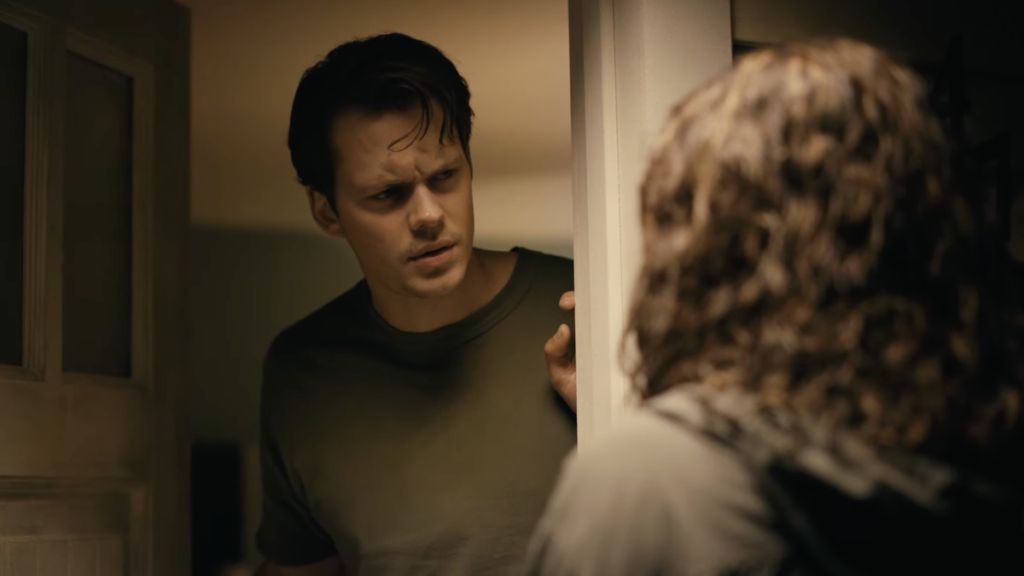
For those who haven’t seen the film, a young woman, Tess, comes to stay at an AirBnB in a poor Detroit suburb while in town for a job interview. But when she gets there, late at night, it turns out a guy, Keith, who says he rented the small home from a separate online rental service, is already there. It’s late. It’s raining. Keith says there’s a convention in town and all the local hotels are full. She might as well stay the night.
What follows is 25 minutes of us wondering if Keith is a bad guy and if he’s set this all up to trap Tess here so he can do God knows what. I suggest you watch the movie yourself before you keep reading this post (it’s free on HBO Max) because I have to get into spoilers. But what happens is, Tess eventually finds a secret room in the basement and both her and a highly suspicious Keith investigate it together. Then something horrid comes out of the shadows and slams Keith’s head against the rock wall repeatedly until his skull cracks.
Before we continue, I’m going to give you the secret to writing great horror.
This is the golden rule that will make you gobs of money if you can perfect it.
All great horror is, is a series of moments where you, the writer, imply something bad is coming, and then milk the suspense until that bad (or, if you want to twist it, un-bad) moment arrives. That is the first act of Barbarian in a nutshell and why it’s so brilliant.
We’re suspicious of Keith right away. Did he really rent this place? Or was he laying in wait? Is he really as good of a guy as he seems? Or is he secretly a monster? You see, once you set that potentially dangerous outcome up, you’ve got the reader on the fishing line. They are all yours.
From there, all you have to do is play with the situation (milk it for everything it’s worth!). So there’s a moment where Keith says, “I’m making tea. Do you want some?” We’ve all seen horror movies before. When a guy is making a drink for a girl, is he really just making her a drink? So you can play with that thread. Is Tess going to drink the tea? As it turns out, she doesn’t drink the tea, which is great, because it means they can suspend the situation even longer.
When you imply a terrible outcome is coming (Tess might be killed), good writers can string that along for five, ten, fifteen, and, in this case, 25 minutes. That’s the secret to writing good horror. You now know what you have to do: set up a potentially bad outcome and milk it. But you still need to practice how to extend the suspense out. Cause if you don’t know what you’re doing, you might invent a lot of silly unbelievable situations that break the magic.
What was so great about Barbarian was that all the suspense was built around real believable situations. Tess wakes up in the middle of the night to find her locked bedroom door open and Keith is on the couch having a nightmare, talking in his sleep. He couldn’t have opened the door. And even if he had, why draw suspicion to himself with the nightmare sleep-talk? So we’re really curious about where this is going.
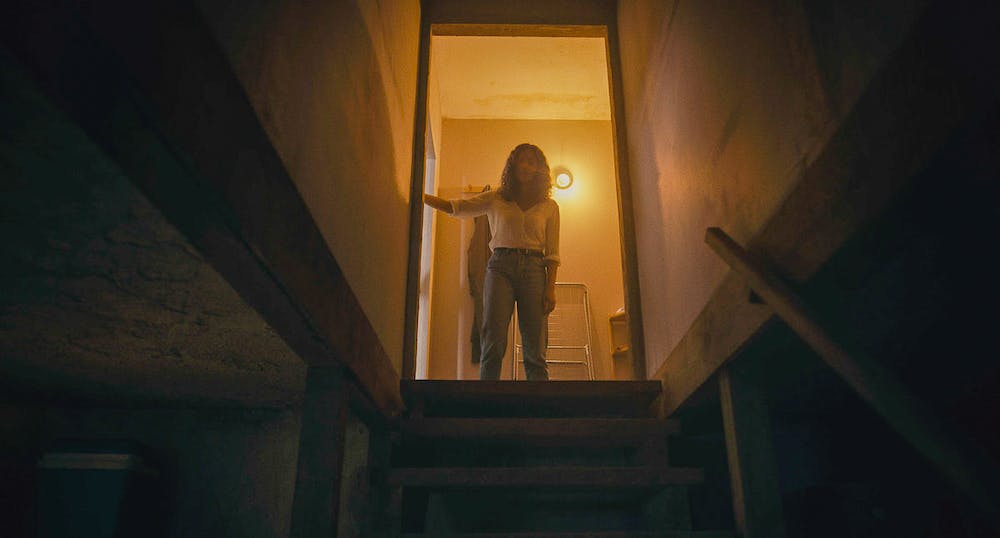
However, once that first act ends, we jump into an entirely different story.
We cut to the Pacific Coast Highway where actor, AJ, gets a phone call from his agents telling him that he’s being accused of rape by his co-star. In other words, we go from a movie that’s entirely about horror and nothing else to straight social-commentary with a fair amount of focus on character development. It becomes the prototypical 2022 modern horror film.
So, the obvious question needs to be asked.
Did it become better or worse when it shifted from classic horror to modern horror?
I argue that once we cross that bridge, the movie loses something.
Now, to be fair, we’re so invested in this spooky house, which AJ finds himself in, that we’re still engaged in the movie. But I couldn’t help but notice that before AJ hit the screen, I’d forgotten I was watching a movie. I really did. And when he and his storyline entered the movie, I became very aware that I was watching a movie. I also became aware that Hollywood was preaching to me.
So what does this mean? Does this mean don’t write modern social commentary character-driven horror? Of course not. Modern horror is what’s selling! So I’m not going to tell you to avoid it. But I do think the audience has caught up to Hollywood. Because of this, they’re more likely to be pulled out of the movie when you preach to them. Whereas, if all you care about is scaring people, and you do what I told you to do above (imply danger is coming and milk it for everything it’s worth), you’re much more likely to write a horror film that everybody loves.
I haven’t seen Smile yet so maybe someone can tell me if there’s a social commentary angle or not. But certainly from the way they’re promoting it, it seems like it’s a movie that just wants to scare you. And how’s that working out for Smile? Oh yeah, it’s just the biggest horror success story in the past four years. That’s the audience telling you something.
But look, if you have a story to tell that you feel passionate about and the themes in it cover any issue (social or otherwise), you can still write a great horror script. It just has to be genuine and not pandering. If you want to know what “pandering” means, look at “They/Them.” That movie was so desperate to push a message that everyone hated it, even the core group it was targeted to. There are no teams when it comes to being annoyingly pandered to.
So don’t write a movie just to appease what Hollywood wants, whether it’s yesterday’s trend, today’s trend, or tomorrow’s. Write a movie that you would write regardless of if the trend existed. Cause when you’re passionate about an idea, that’s worth something on the page. Promising Young Woman was social commentary but you could tell that it wasn’t pandering. Emerald needed to tell that story no matter what.
It’s so funny that a single movie would come out that shows you, via a direct comparison, how true horror and modern horror compare. Who won? You decide.
And guess what? I have a treat for you guys. You can read the Barbarian script below if you don’t have HBO Max. Make sure to tell me what you think in the comments.
Script link: Barbarian
Do you want a script consultation with Scriptshadow? E-mail me if you’re looking to get feedback on your script. You can check out the consult page here but I also offer pretty much any feedback you need, from a logline to a script synopsis to your first act to your whole script! E-mail me at carsonreeves1@gmail.com and let me help you make your script great!

